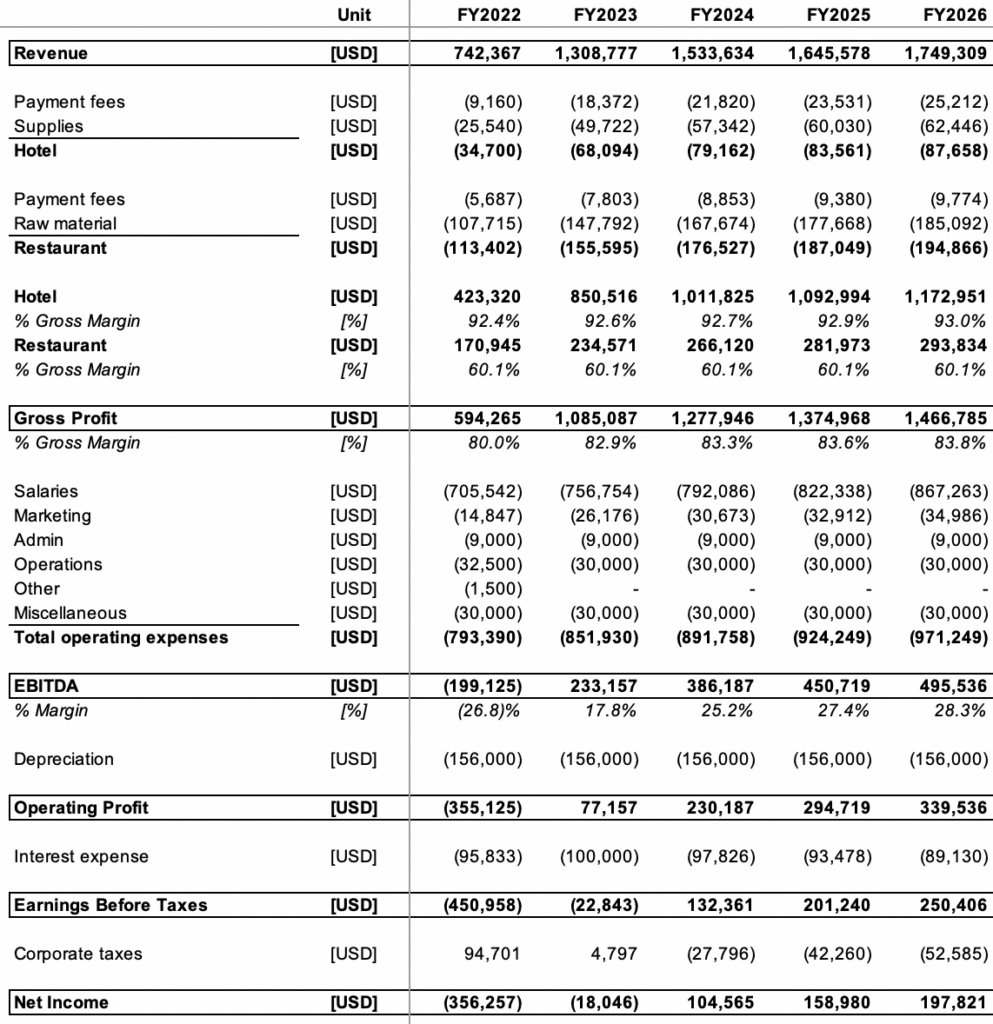How Much Profits can you Make with a Boutique Hotel?

Because they typically have higher RevPAR vs. traditional hotel, boutique hotels can be very profitable businesses. Yet, if you’re looking to start your own boutique hotel, you may want to know how much profits you can realistically make with this business.
Indeed, with 4,487 boutique hotels in the US, this is also a very competitive industry. Not to mention the 132,228 hotels in the US alone it competes with.
How profitable is a boutique hotel in the US? In this article we’ll look into how much profits you can expect to make with a hotel using public benchmarks as well as our own analysis below. Let’s dive in!
What is the average turnover of a boutique hotel?
As per IBIS, the total market size of boutique hotels in the US is about $23.2 billion. With over 4,487 boutique hotels across the country, the average turnover per boutique hotel is $5,125,000 per year.
However, in general, each boutique hotel will be different in size, location, services offered, etc. and hence, the annual turnover for individual boutique hotels will be different.
It’s interesting to note that, according to Asian Hospitality, boutique hotels in the US have a higher RevPAR (revenue per available room) compared to traditional hotels. This means that their turnover is higher for the same number of rooms vs. a traditional hotel.
When it comes to pay, Epos Now reports that hotel owners make on average anywhere between $40,000 and $60,000 per year.
What is the average profit margin of a boutique hotel?
According to Hotel Management, the gross operating profit margin for boutique hotels in 2017 was 33.8%.
Skift reported that in April 2022, US boutique hotels registered an average gross operating profit per available room of $113.
Remember, these are all gross operating profit margins. Therefore, you can expect net profit margins to be much lower as there are additional operating expenses to account for.
In order to forecast net profit margin instead, we need to look at your profit-and-loss, and consider all expenses. Let’s now have a look at what kind of expenses you can expect to run a hotel.
How much does it cost to run a boutique hotel?
A boutique hotel has various operating costs, and they include:
- Hotel COGS (~5% sales): this includes mostly room supplies (laundry, toiletries, minibar items, etc.)
- Restaurant COGS (~10% sales): the cost to source the food and beverage from suppliers
- Salaries (~50% sales): You must provide salaries to your staff such as operations, reception, room service, housekeeping, landscaping, management & admin, etc. Labor costs are by far the largest expenses you must pay for (assuming you own the building i.e. you do not rent)
- Other (~5-10% sales): utility bills, bookkeeping, legal, marketing, etc.
- Depreciation: these are non-cash expenses (the depreciation of the building and the furniture for example)
- Interest & taxes: mostly the debt interest expenses if you took a loan from the bank (to acquire the building for example)
We have identified that it costs $73,000 to $91,000 on average to run a 20-room boutique hotel.
We have also included below the revenue to net profit breakdown of a small boutique hotel in the US ($1.75 million turnover).
Although profit margin is rather high (14%), most of these profits will be used to pay for other cash items (especially the repayment of the loan, assuming you bought the real estate). Assuming you would have decided to rent instead, net profit margin would be much lower.

How to forecast profits for a Hotel?
In order to calculate profits for your hotel, you must first forecast sales and expenses.
Profits = Sales – Expenses
Forecasting sales for a hotel
In order to forecast the revenue for your hotel, you must set 2 assumptions:
- The number of available rooms
- The revenue per available room (RevPAR)
Revenue = # available rooms x RevPAR
For example, if you have a small premium boutique hotel with 20 rooms and a RevPAR of $250, then monthly revenue is:
Revenue = 20 x $250 x 30 days = $150,000
Forecasting expenses for a hotel
There are 2 types of expenses for a hotel:
- Variable expenses: these are the COGS as explained earlier. They grow in line with your revenue: if your turnover increases by 10%, variable expenses grow by 10% as well
- Fixed expenses: salaries, operations and all the other costs listed above
Calculating profits for a hotel
When we refer to profits, we usually refer to EBITDA (Earnings before interests, taxes, depreciation and amortization) as it represents the core profitability of the business, excluding things such as debt interests, non cash expenses and other non-core expenses.
In order to get to EBITDA, we use the following formula:
EBITDA = Revenue – COGS – Operating Expenses
We’ve included below the profit-and-loss of a hotel (from our financial model template for hotels).
Whilst EBITDA can reach 30% for the most successful hotels, net profit margin can go up to 10-15% instead. That’s because depreciation and interest expenses are typically very high for hotels. Indeed, most hotels own their own real estate, which they depreciate over time and for which they usually take a loan that they pay interest on.

How to increase profits for a boutique hotel?
You can increase the profitability of your boutique hotel by introducing various strategies that include:
- Property Management System: Introducing a PMS or Property Management System can help you to manage your time efficiently by reducing non-value-adding admin tasks
- Delight Guests: Consider upselling a bigger room, upgrading to a room with better views, or reduce charges for longer stays, and so on. This can help you to attract more customers and even allow guests to increase their stays
- Maximize Booking Channels: Work with booking sites like Booking.com, Trip Advisor, etc. while ensuring that the commission rates you pay to those channels don’t make a dent in your profits significantly
- Open Direct Online Booking: You can open direct online booking through your hotel website and offer discounted rates for direct booking
- Ask for Recommendations: Ask your existing guests and past guests to recommend your hotel if they are happy with their stay and your services. Word-of-mouth promotion is one of the best advertisements you can enjoy without paying a dime
- Loyalty Program: For repeat guests, consider starting a loyalty program to increase their lifetime value





